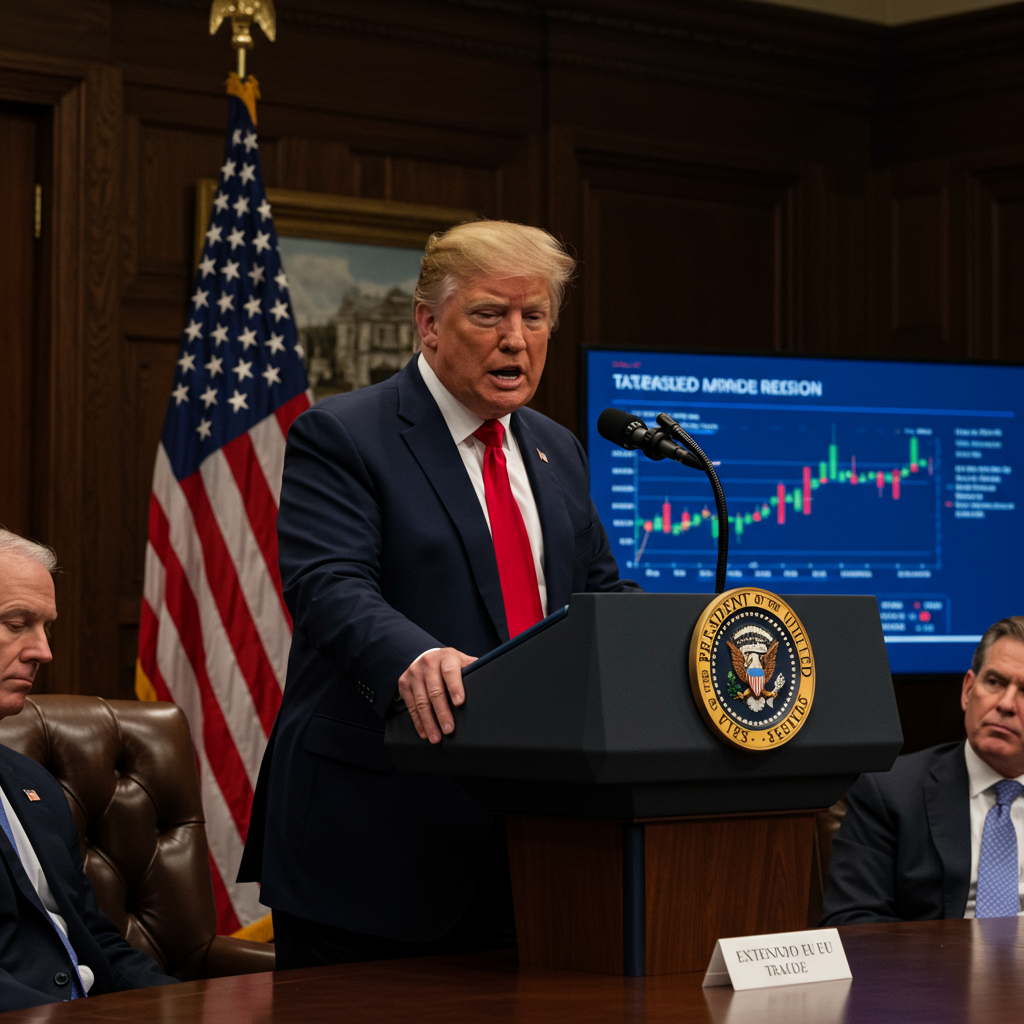Trump Steps Back From Immediate 50% EU Tariff Threat, Extends Talks
Former US President Donald Trump has agreed to push back a critical deadline for imposing potentially massive tariffs on European Union goods, extending the timeline for trade negotiations by over a month. The decision follows a period of heightened tension ignited by Trump’s threat to hit EU imports with a steep 50% tax as early as June 1st.
The aggressive threat, made public on Friday via social media just hours before scheduled trade talks, marked a significant escalation. Trump had previously announced a 20% import tax on most EU products, later reducing it to 10% to facilitate discussions. However, expressing frustration with the pace of negotiations, he warned he was prepared to drastically raise the rate to 50%, stating, “I’m not looking for a deal – we’ve set the deal.” He cited a long list of grievances, including “powerful Trade Barriers, Vat Taxes, ridiculous Corporate Penalties, Non-Monetary Trade Barriers, Monetary Manipulations, [and] unfair and unjustified lawsuits against Americans Companies,” claiming these contributed to a significant and “totally unacceptable” trade deficit with the bloc.
A Weekend Shift: From Threat to Extension
Just two days later, on Sunday, Trump announced a change of course. Via Truth Social, he stated he was pushing the deadline back to July 9th. He attributed this shift to a “very nice” and “good call” with European Commission President Ursula von der Leyen, describing it as his “privilege” to agree to her request for time to allow for “serious negotiation” and for talks to “begin rapidly” to “work something out.”
Von der Leyen confirmed the positive nature of the call, stating that Europe was “ready to advance talks swiftly and decisively” and confirmed the need for the extension until July 9th to secure a “good deal.” Notably, the new July 9th deadline aligns closely with a previous deadline set before the 50% threat, and also coincides with the expiration date of a prior 90-day pause Trump had announced on certain “reciprocal” charges against the EU.
Underlying Trade Friction and Economic Impact
This recent development is set against the backdrop of Trump’s long-standing criticism of the US trading relationship with the EU, which he views as fundamentally unfair despite the bloc being one of Washington’s largest trading partners. US government data has shown a significant imbalance in goods trade, with the EU exporting considerably more to the US than it imports.
Trump consistently defends his tariff program as necessary to boost American manufacturing and protect domestic jobs. However, his use of import taxes has drawn widespread criticism from economists and business leaders. Many argue that tariffs introduce chaos into the global economy, increase costs for US consumers (as tariffs are taxes paid by importing companies), and harm both domestic and international businesses. Specific areas of concern raised by Trump in EU trade include cars and agricultural products, although a 25% levy on EU steel and aluminum imports from his previous term remains in effect.
EU Reacts and Prepares
The EU responded firmly to the 50% tariff threat. EU Trade Commissioner Maroš Šefčovič reaffirmed the bloc’s commitment to a fair deal, emphasizing that EU-US trade should be guided by mutual respect, not threats, while affirming the EU’s readiness to defend its interests. European leaders, including those from France and Germany, echoed these sentiments, cautioning against escalation and stressing that tariffs would ultimately harm both economies. Ireland’s Taoiseach Micheál Martin called the threat “enormously disappointing,” advocating for negotiation as the only sustainable path.
The bloc has also prepared potential retaliatory measures, having previously threatened and then paused a 25% tariff on €18 billion worth of US goods. The EU is also currently exploring additional measures targeting up to €95 billion in US imports.
Analysts interpreted Trump’s threat as a tactic to gain leverage and accelerate stalled negotiations, with US Treasury Secretary Scott Bessent openly stating the aim was to “light a fire under the E.U.” The initial 50% threat did cause negative reactions in financial markets, with major indices in the US and Europe seeing declines.
While the immediate threat of a June 1st 50% tariff has passed, the extension to July 9th simply resets the clock on high-stakes trade negotiations between the two economic giants, leaving the potential for significant tariffs looming.
References
- https://www.bbc.com/news/articles/cdd2mz719yvo
- https://time.com/7288483/trump-european-union-tariff-threat-trade-war-concerns/
- https://www.bbc.com/news/articles/cgr5xrygzk5o
- https://www.bbc.co.uk/news/articles/cdd2mz719yvo
- https://www.foxbusiness.com/markets/trump-grants-eu-tariff-extension-after-good-call-ursula-von-der-leyen


